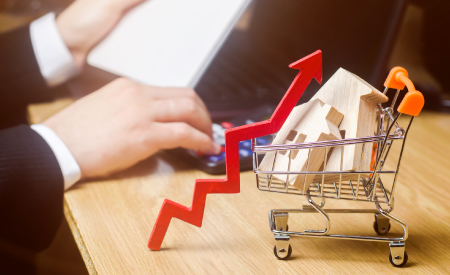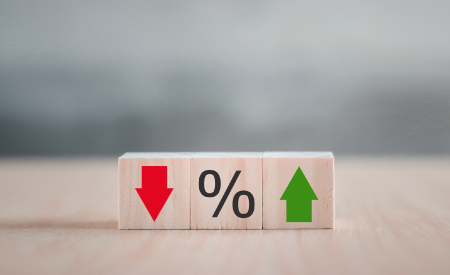Cos'è l'inflazione?
L'inflazione è l'aumento generalizzato dei prezzi dei beni (cibo, energia elettrica, carburanti, ecc.) e dei servizi (un taglio di capelli, un biglietto del treno, ecc.).
L'inflazione non riguarda, quindi, il prezzo di singoli prodotti ma è legata all'aumento generale dei prezzi dei beni e servizi in un determinato periodo di tempo.
L'aumento dei prezzi diminuisce la quantità di beni o servizi che possiamo acquistare con i nostri soldi: per questo si dice che l'inflazione riduce il valore della moneta nel tempo.
Cento euro oggi non valgono come cento euro domani
Mario, il titolare di una trattoria, ha a disposizione una banconota da 100 euro per comprare ogni giorno il pane necessario. Un chilo di pane costa 4 euro, quindi Mario può acquistarne 25 chili. Immaginiamo ora che, a causa dell'inflazione, il prezzo del pane salga a 5 euro al chilo: Mario, con la stessa banconota da 100 euro, potrà adesso comprare solo 20 chili di pane. Di fatto, a causa dell'inflazione, la banconota "vale" adesso solo 20 chili di pane, mentre prima dell'aumento del prezzo il suo valore in termini di pane era di 25 chili.
Per gli economisti, i 100 euro della banconota sono il valore nominale, mentre la quantità di beni e servizi, che possono essere acquistati - il pane, nel nostro caso - rappresenta il valore reale della banconota. Nel nostro esempio il valore nominale della banconota dopo la crescita del prezzo del pane rimane di 100 euro mentre a causa dell'inflazione il suo valore reale scende da 25 a 20 chili di pane. In altre parole, i 100 euro valgono di meno, hanno perso potere di acquisto a causa dell'aumento dei prezzi.
A proposito di pane e di generi alimentari di prima necessità, uno dei casi più eclatanti di inflazione o, meglio, di iperinflazione è quello della Repubblica di Weimar (Germania, autunno 1923): la diminuzione del valore del marco, la moneta tedesca di allora, arrivò a livelli tali che per andare a fare la spesa sarebbe stato necessario portare dei carretti pieni di banconote (qui un approfondimento).
Il contrario dell'inflazione, cioè la diminuzione generalizzata dei prezzi, viene definita deflazione.
Livelli elevati di inflazione o deflazione sono, quindi, dannosi per cittadini ed economia. Per questo, una bassa inflazione stabile e prevedibile è considerata segno di un'economia sana.
Se vuoi saperne di più, scopri tutti gli approfondimenti.










 Youtube
Youtube
 X - Banca d’Italia
X - Banca d’Italia
 Linkedin
Linkedin
 RSS
RSS